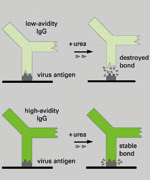Avidity tests to determine acute infections
A portfolio of avidity tests allows the discrimination of acute from past infections via the determination of the avidity of specific IgG antibodies. This is particularly relevant in pregnancy diagnostics, where an acute infection may pose a risk to the foetus. The avidity product range includes ELISA and indirect immunofluorescence tests (IIFT) for Toxoplasma gondii, rubella virus, Epstein-Barr virus, West Nile virus, cytomegalovirus, varicella zoster virus, measles virus and TBE virus infection status. All assays incorporate an incubation step with a urea solution, which destroys the weak bonds between low-avidity antibodies and the antigenic target, while leaving the stable bonds formed by high-avidity antibodies intact. Bound antibodies are then detected according to the usual ELISA or IIFT procedure. The detection of high-avidity antibodies is a reliable indication that an infection took place some time ago, whereas low-avidity antibodies indicate an acute infection. Avidity determination supplements the investigation of IgM antibodies, which is traditionally used to identify acute infections, but which has several limitations: IgM may be only transient or may not be reliably detected in an acute infection, or IgM may persist for months or years after recovery, making interpretation difficult. In these instances, avidity testing can clarify the diagnosis without the need to take a second sample from the patient.
Supplier: EUROIMMUN AG
Website:



